In recent years, the popularity of plant-based diets has surged, driven by growing awareness of their health benefits, environmental impact, and ethical considerations. A plant-based diet emphasizes foods derived from plants, including vegetables, fruits, grains, nuts, seeds, and legumes, while minimizing or eliminating animal products. While it’s not necessarily a vegetarian or vegan diet, it focuses primarily on whole, unprocessed plant foods.
This dietary approach is not just a passing trend but is supported by science as an effective way to improve health, promote sustainability, and enhance overall well-being. Let’s explore the key benefits of a plant-based diet in these three areas: health, sustainability, and well-being.
Health Benefits of a Plant-Based Diet

- Reduced Risk of Chronic Diseases
A plant-based diet is rich in fiber, vitamins, minerals, and antioxidants, all of which play a vital role in reducing the risk of chronic diseases. Numerous studies have shown that people who follow plant-based diets are less likely to develop conditions such as heart disease, type 2 diabetes, high blood pressure, and certain types of cancer.
For instance, plant-based diets are associated with lower cholesterol levels and improved heart health, primarily due to the absence of saturated fats and cholesterol found in animal products. Instead, plant-based foods like fruits, vegetables, and whole grains are rich in heart-healthy nutrients like fiber and healthy fats.
- Weight Management
One of the most significant benefits of a plant-based diet is its ability to support weight management. Since plant-based foods tend to be lower in calories and higher in fiber, they help people feel fuller for longer periods, reducing the likelihood of overeating. Studies have shown that individuals who follow plant-based diets typically have lower body mass indexes (BMIs) and are less likely to be obese.
Furthermore, the diet’s emphasis on whole, unprocessed foods can lead to a reduction in caloric intake, making it easier to maintain a healthy weight without feeling deprived.
- Improved Digestive Health
A diet rich in plant foods, especially high-fiber foods like legumes, whole grains, fruits, and vegetables, is excellent for digestive health. Fiber helps maintain regular bowel movements, reduces the risk of constipation, and promotes the growth of healthy gut bacteria.
The diversity of plant foods also introduces various nutrients that support gut health, which in turn can improve immune function and lower the risk of developing gastrointestinal issues.
- Enhanced Immune Function
Plant-based diets are packed with essential vitamins, minerals, and antioxidants that help bolster the immune system. Foods like leafy greens, berries, citrus fruits, and nuts contain high levels of nutrients such as vitamin C, vitamin E, and zinc, which are vital for maintaining immune health. By providing the body with the necessary tools to fight infections and inflammation, plant-based diets may lead to a stronger, more resilient immune system.
- Increased Energy Levels
Consuming a variety of nutrient-dense plant foods can help increase energy levels. Carbohydrates from whole grains, fruits, and vegetables provide a steady release of energy throughout the day, while healthy fats from nuts, seeds, and avocados offer sustained fuel. Plant-based foods are also less taxing on the digestive system, allowing the body to allocate more energy to daily activities and mental clarity.
Sustainability Benefits of a Plant-Based Diet

- Reduced Carbon Footprint
The environmental impact of animal agriculture is immense. Livestock farming is one of the largest contributors to greenhouse gas emissions, deforestation, and water pollution. By adopting a plant-based diet, individuals can significantly reduce their carbon footprint. Research indicates that plant-based diets produce lower levels of carbon dioxide, methane, and nitrous oxide—gases responsible for global warming—compared to diets rich in animal products.
- Conservation of Water Resources
Animal agriculture is highly water-intensive. It takes approximately 1,800 gallons of water to produce just one pound of beef, whereas growing plant-based foods like grains and vegetables requires far less water. By switching to a plant-based diet, you’re helping to conserve precious water resources and reduce the strain on freshwater supplies.
- Reduced Land Use
Growing crops to feed livestock requires vast amounts of land, leading to deforestation, loss of biodiversity, and soil degradation. A plant-based diet reduces the demand for land used for animal farming, allowing more land to be preserved for natural ecosystems or to grow food for human consumption.
- Lower Energy Consumption
Animal farming consumes significant amounts of energy for feeding, housing, transportation, and processing livestock. In contrast, producing plant-based foods generally requires far less energy, leading to a reduction in the overall energy demand. By choosing a plant-based diet, you contribute to lowering energy consumption, which helps mitigate the environmental impact of food production.
Well-being and Ethical Considerations of a Plant-Based Diet

- Compassion for Animals
One of the primary motivations for many people adopting a plant-based diet is concern for animal welfare. By reducing or eliminating animal products from your diet, you can take a stand against factory farming practices, which often involve cruelty and exploitation. A plant-based diet allows individuals to align their dietary choices with their values of compassion and kindness toward animals.
- Mental Health and Well-being
What we eat can significantly influence our mental health. Studies have shown that plant-based diets can improve mood, reduce symptoms of depression, and increase feelings of well-being. The abundance of antioxidants, vitamins, and minerals in plant-based foods supports brain health, while the absence of processed foods and excess animal fats reduces the risk of cognitive decline.
- Increased Mindfulness
Eating a plant-based diet often encourages people to become more mindful about what they consume and how their choices affect the environment, animals, and their own health. This mindfulness can extend to other areas of life, promoting a sense of awareness, intentionality, and connection with the world around them.
How to Transition to a Plant-Based Diet
Transitioning to a plant-based diet doesn’t have to be an all-or-nothing approach. You can start by incorporating more plant-based meals into your weekly routine. Here are some tips for a smooth transition:
- Start with Meatless Mondays: Choose one day a week to eat entirely plant-based meals.
- Experiment with Plant Proteins: Try plant-based protein sources like beans, lentils, tofu, and tempeh to replace meat.
- Focus on Whole Foods: Avoid highly processed plant-based alternatives and focus on whole foods like fruits, vegetables, nuts, and grains.
- Plan Balanced Meals: Ensure your meals are well-balanced, with a mix of proteins, fats, and carbohydrates to keep you energized and full.
- Educate Yourself: Learn about the nutritional benefits of plant-based foods and how they can meet your dietary needs.
Conclusion
A plant-based diet offers a wide range of benefits, from improved health outcomes to reduced environmental impact and enhanced well-being. By incorporating more plant-based foods into your diet, you can take proactive steps to support your physical health, protect the planet, and align with ethical values. Whether you’re looking to reduce your carbon footprint, manage your weight, or improve your overall health, adopting a plant-based diet is a powerful way to achieve these goals.
Frequently Asked Questions (FAQs)
Q1: Is a plant-based diet the same as being vegan or vegetarian?
No, a plant-based diet emphasizes foods derived from plants but doesn’t necessarily eliminate all animal products. While vegans and vegetarians avoid animal products entirely, plant-based eaters may occasionally include small amounts of animal products.
Q2: Can I get enough protein on a plant-based diet?
Yes, there are many plant-based protein sources such as lentils, beans, tofu, tempeh, quinoa, and nuts that provide ample protein. You can meet your protein needs by eating a variety of these foods throughout the day.
Q3: Is a plant-based diet more expensive?
Not necessarily. While some plant-based alternatives can be pricey, whole plant foods like beans, rice, potatoes, and vegetables are often less expensive than meat and processed foods. You can save money by buying in bulk and focusing on simple, whole ingredients.
Q4: Do I need supplements on a plant-based diet?
While a well-balanced plant-based diet can provide most nutrients, some people may need to supplement nutrients like vitamin B12, vitamin D, and omega-3 fatty acids, which are harder to obtain from plant foods alone.
Q5: How do I avoid processed plant-based foods?
Focus on whole foods like fruits, vegetables, legumes, grains, and nuts. While there are many processed plant-based alternatives on the market, it’s best to limit these and prioritize natural, minimally processed foods.




